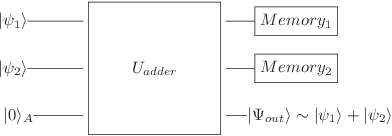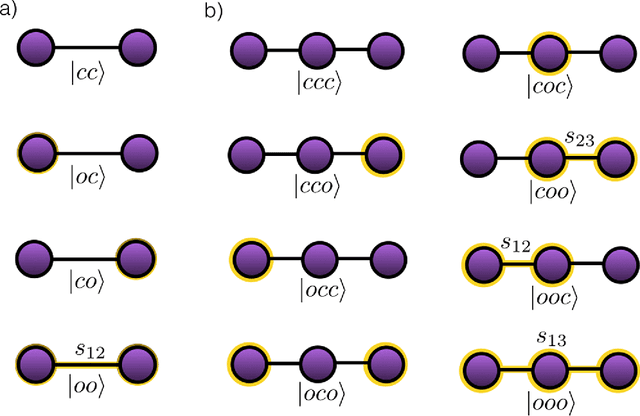Lucas Lamata
Quantum memristors for neuromorphic quantum machine learning
Dec 25, 2024Abstract:Quantum machine learning may permit to realize more efficient machine learning calculations with near-term quantum devices. Among the diverse quantum machine learning paradigms which are currently being considered, quantum memristors are promising as a way of combining, in the same quantum hardware, a unitary evolution with the nonlinearity provided by the measurement and feedforward. Thus, an efficient way of deploying neuromorphic quantum computing for quantum machine learning may be enabled.
Digital-Analog Quantum Machine Learning
Nov 16, 2024Abstract:Machine Learning algorithms are extensively used in an increasing number of systems, applications, technologies, and products, both in industry and in society as a whole. They enable computing devices to learn from previous experience and therefore improve their performance in a certain context or environment. In this way, many useful possibilities have been made accessible. However, dealing with an increasing amount of data poses difficulties for classical devices. Quantum systems may offer a way forward, possibly enabling to scale up machine learning calculations in certain contexts. On the other hand, quantum systems themselves are also hard to scale up, due to decoherence and the fragility of quantum superpositions. In the short and mid term, it has been evidenced that a quantum paradigm that combines evolution under large analog blocks with discrete quantum gates, may be fruitful to achieve new knowledge of classical and quantum systems with no need of having a fault-tolerant quantum computer. In this Perspective, we review some recent works that employ this digital-analog quantum paradigm to carry out efficient machine learning calculations with current quantum devices.
Quantum Machine Learning Implementations: Proposals and Experiments
Mar 11, 2023Abstract:This article gives an overview and a perspective of recent theoretical proposals and their experimental implementations in the field of quantum machine learning. Without an aim to being exhaustive, the article reviews specific high-impact topics such as quantum reinforcement learning, quantum autoencoders, and quantum memristors, and their experimental realizations in the platforms of quantum photonics and superconducting circuits. The field of quantum machine learning could be among the first quantum technologies producing results that are beneficial for industry and, in turn, to society. Therefore, it is necessary to push forward initial quantum implementations of this technology, in Noisy Intermediate-Scale Quantum Computers, aiming for achieving fruitful calculations in machine learning that are better than with any other current or future computing paradigm.
Quantum machine learning and quantum biomimetics: A perspective
May 30, 2020



Abstract:Quantum machine learning has emerged as an exciting and promising paradigm inside quantum technologies. It may permit, on the one hand, to carry out more efficient machine learning calculations by means of quantum devices, while, on the other hand, to employ machine learning techniques to better control quantum systems. Inside quantum machine learning, quantum reinforcement learning aims at developing "intelligent" quantum agents that may interact with the outer world and adapt to it, with the strategy of achieving some final goal. Another paradigm inside quantum machine learning is that of quantum autoencoders, which may allow one for employing fewer resources in a quantum device via a training process. Moreover, the field of quantum biomimetics aims at establishing analogies between biological and quantum systems, to look for previously inadvertent connections that may enable useful applications. Two recent examples are the concepts of quantum artificial life, as well as of quantum memristors. In this Perspective, we give an overview of these topics, describing the related research carried out by the scientific community.
Experimental Implementation of a Quantum Autoencoder via Quantum Adders
Jul 27, 2018



Abstract:Quantum autoencoders allow for reducing the amount of resources in a quantum computation by mapping the original Hilbert space onto a reduced space with the relevant information. Recently, it was proposed to employ approximate quantum adders to implement quantum autoencoders in quantum technologies. Here, we carry out the experimental implementation of this proposal in the Rigetti cloud quantum computer employing up to three qubits. The experimental fidelities are in good agreement with the theoretical prediction, thus proving the feasibility to realize quantum autoencoders via quantum adders in state-of-the-art superconducting quantum technologies.
Supervised Quantum Learning without Measurements
Oct 23, 2017



Abstract:We propose a quantum machine learning algorithm for efficiently solving a class of problems encoded in quantum controlled unitary operations. The central physical mechanism of the protocol is the iteration of a quantum time-delayed equation that introduces feedback in the dynamics and eliminates the necessity of intermediate measurements. The performance of the quantum algorithm is analyzed by comparing the results obtained in numerical simulations with the outcome of classical machine learning methods for the same problem. The use of time-delayed equations enhances the toolbox of the field of quantum machine learning, which may enable unprecedented applications in quantum technologies.
Basic protocols in quantum reinforcement learning with superconducting circuits
May 09, 2017



Abstract:Superconducting circuit technologies have recently achieved quantum protocols involving closed feedback loops. Quantum artificial intelligence and quantum machine learning are emerging fields inside quantum technologies which may enable quantum devices to acquire information from the outer world and improve themselves via a learning process. Here we propose the implementation of basic protocols in quantum reinforcement learning, with superconducting circuits employing feedback-loop control. We introduce diverse scenarios for proof-of-principle experiments with state-of-the-art superconducting circuit technologies and analyze their feasibility in presence of imperfections. The field of quantum artificial intelligence implemented with superconducting circuits paves the way for enhanced quantum control and quantum computation protocols.
* Published version
 Add to Chrome
Add to Chrome Add to Firefox
Add to Firefox Add to Edge
Add to Edge